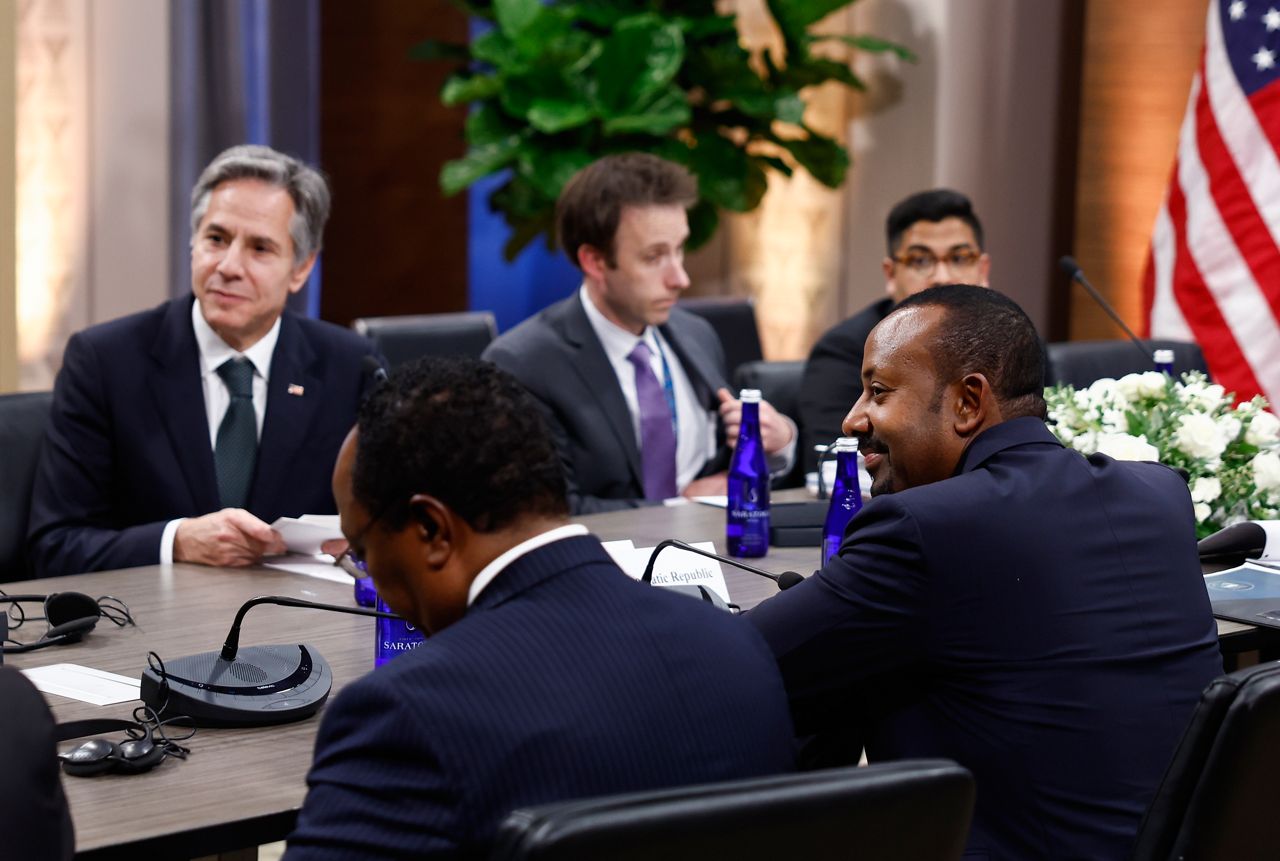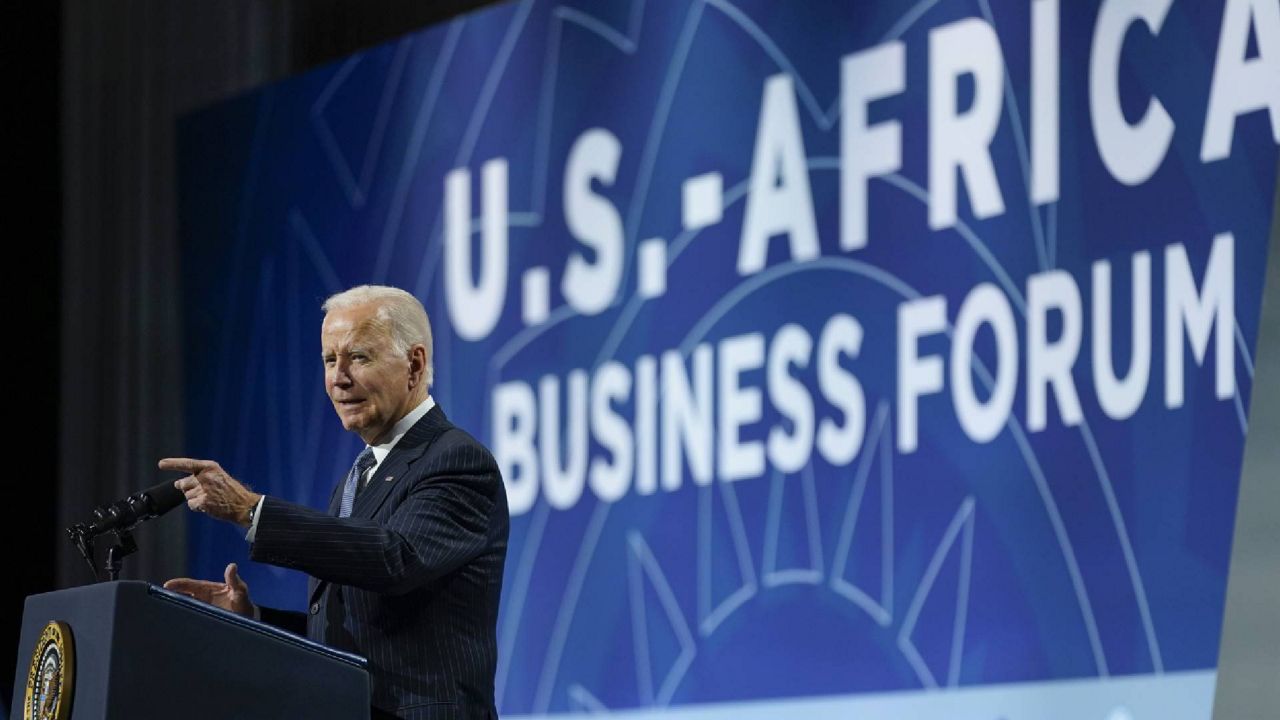President Joe Biden told dozens of African leaders gathered in Washington that the United States is “all in on Africa’s future," laying out billions in promised government funding and private investment Wednesday to help the growing continent in health, infrastructure, business and technology.
Biden on Wednesday presented his vision during the three-day U.S.-Africa Leaders Summit, an effort to narrow a trust gap with Africa that has widened over years of frustration about America's commitment to the continent. The Biden administration is pitching the U.S. as a reliable and quality partner to help promote fair and democratic elections and push critical health and energy growth.
Biden said during his time as vice president he visited "almost all" of the countries represented in Washington Wednesday, getting a first hand look at the "enormous potential" of U.S.-Africa cooperation.
"We're still grappling with a deadly pandemic, facing down war and instability, addressing economic challenges with global impact, fighting rising food prices, tackling climate change," he said. "We can't solve any of these challenges without African leadership at the table. And I'm not trying to be nice. That's a fact."
Biden, who is pitching the U.S. as a reliable partner to promote democratic elections and push critical health and energy growth, told the crowd the $55 billion in committed investments over the next three years — announced on Monday — was “just the beginning.”
He announced more than $15 billion in private trade and investment commitments and partnerships.
“There’s so much more we can do together and that we will do together,” he said.
But this push comes as the United States has fallen well behind China in investment in sub-Saharan Africa, which has become a key battleground in an increasingly fraught competition between the major powers. The White House insists the gathering is more a listening session with African leaders than an effort to counter Beijing's influence, but Biden's central foreign policy tenet looms over all: America is in an era-defining battle to prove democracies can out-deliver autocracies.
That message was clear in Wednesday's events: a Biden speech before business leaders from both continents, a smaller presidential sitdown with some of the continent’s leaders whose countries will hold elections in 2023, and a first lady-hosted White House dinner for all the leaders and their spouses.
Gladys Knight and the St. Augustine Gospel Choir of Washington D.C. will perform, and the food will be done by Mashama Bailey, the executive chef of The Grey, a Southern cooking spot in Savannah, Ga.
Jill Biden hosted a program for spouses Wednesday morning at the Kennedy Center for Performing Arts, where she told the crowd "my hope is that the way we make each other feel will last beyond this summit.”
President Biden watched Morocco's World Cup match against France Wednesday afternoon with the country's prime minister, after shouting out the team in his speech as "the first African nation in the semfinals."

The funding announced Wednesday includes $350 million to help the continent’s effort to digitally modernize, and $350 million to advance women’s workplace equality and entrepreneurship. The first lady’s office pledged $300 million for cancer prevention, screening, treatment and research in Africa.
Biden has committed to $55 billion in economic aid to African countries over the next three years, U.S. support for a permanent Group of 20 seat for the African Union, and the appointment of a special representative to implement summit commitments.
The summit is the largest international gathering in Washington since before the start of the pandemic. Roads all around the city center were blocked off, and motorcades zoomed by gridlocked traffic elsewhere, ferrying some of the 49 invited heads of state and other leaders.
Africa, whose leaders often feel they’ve been given short shrift by leading economies, remains crucial to global powers because of its rapidly growing population, significant natural resources and sizable voting bloc in the United Nations. Africa also remains of great strategic importance as the U.S. recalibrates its foreign policy with greater focus on China — the nation the Biden administration sees as the United States’ most significant economic and military adversary.
White House officials on Wednesday rejected the notion that the summit is about countering China’s influence.
National Security Council spokesman John Kirby said the administration is “refusing to put a gun” to Africa’s head and make it choose between U.S. and China. At the same, he said “there’s nothing inconsistent about calling a fact a fact and shedding light on what is increasingly obvious to our African partners about China’s malign influence on the continent.”
The summit-related activity got a rise out of China. Foreign Ministry spokesperson Wang Wenbin said the U.S. should “respect the will of the African people and take concrete actions to help Africa’s development, instead of unremittingly smearing and attacking other countries,” an apparent reference to China.
Wang said at a briefing Wednesday that it is the “common responsibility of the international community to support Africa’s development.” But he added: “Africa is not an arena for great power confrontation or a target for arbitrary pressure by certain countries or individuals.”
Vice President Kamala Harris opened the summit Tuesday spotlighting Africa’s youthful population and announced that the administration would invest an additional $100 million to expand the Young African Leaders Initiative. About 60% of Africa’s population is under 25, and the young population is expected to grow to 80% by 2050.
Conflict on the continent was a primary focus of Secretary of State Antony Blinken’s meetings on Tuesday with the leaders of Ethiopia, where a fragile peace deal is holding in the country’s restive northern Tigray region, and the Democratic Republic of Congo, the eastern region of which is embroiled in violence involving domestic rebel groups and others supported by neighboring Rwanda.

Ethiopian Prime Minister Abiy Ahmed called his meeting with Blinken “candid and productive” but made clear he had come to Washington with economic recovery also in mind, tweeting about his meeting with the International Monetary Fund managing director on the need for “debt resolutions” and more, and had a “substantive discussion” with the president of the World Bank Group, David Malpass. The Tigray conflict has badly hurt what had been one of Africa’s fastest-growing economies.



